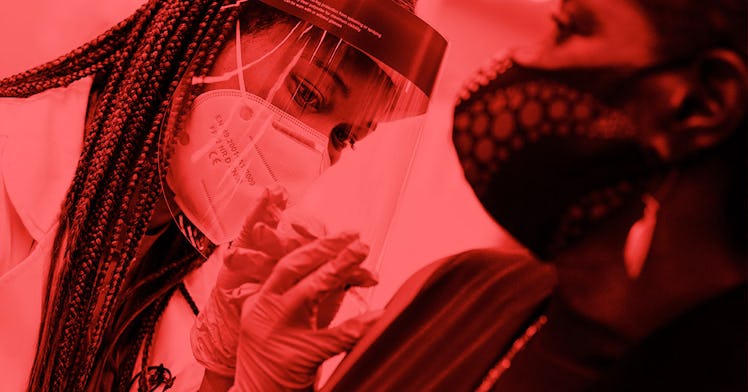Making Sense of the 6 Ethical Problems With the COVID Booster Shot
So much of the world hasn’t had the chance to get vaccinated yet. But that shouldn’t stop you from getting your third dose, a medical ethicist explains.

By this point, nearly everyone in the U.S. who wants a COVID vaccine has been able to get one. Unfortunately, that’s only about 77 percent of the eligible population. As such, COVID rates are high in much of the country, prolonging the COVID-19 pandemic. This not only hurts the unvaccinated, including young children, but also the vaccinated via breakthrough infections.
Most breakthrough cases don’t warrant worry. They’re rare to begin with — the infection rate is somewhere between 1 in 100 and 1 in 5,000 fully vaccinated people, according to Johns Hopkins Medicine — and severe cases are even rarer. But if they diminish risk in any way for unvaccinated kids, shouldn’t parents get them? Or, with so many people in the world still unable to get their first dose, is getting a COVID booster just plain wrong?
The 65+ Mandate: Who Should Get a Booster
Moderna and Pfizer boosters are only authorized for adults who are 65+, or who have underlying conditions, live in a high-risk setting such as a nursing home, or work in a high-risk setting such as a hospital. Additionally, any adult who received the Johnson and Johnson vaccine more than two months ago is eligible to get a booster shot. A mix-and-match approach is now being adopted, so your booster can be of a different brand than your initial vaccine.
In practice, however, just about anyone who wants to get a COVID booster shot can, no matter their age, occupation, or health status. Most vaccine distributors don’t care if you’ve gotten two doses before, says Arthur Caplan, PhD, a medical ethicist at NYU Langone Health. If they do ask, you could easily lie and say you’re unvaccinated.
So in what situations is it ethical to get a booster, and when could getting the shot be a moral failing? This ethical FAQ covers just about any scenario you could find yourself in.
I’m Eligible for a Booster. Does Getting It Mean Taking Away COVID Shots from Kids?
Fear not. The vaccines for kids under age 12 come in completely different vials than the vaccine for adolescents and adults. That’s because kids need much smaller doses (one-third of the adult dose of the Pfizer vaccine). So you getting a booster does not take a shot away from a vulnerable child.
What About a More Vulnerable Adult in the U.S.? Won’t They Be Missing Out If I Take Their Booster?
Earlier in the pandemic, when vaccines were scarce in the U.S., you would have had to worry about taking a dose away from another American who needed it more. That’s not an issue now. Vaccines are widely available in this country. You getting a COVID vaccine booster does not mean that another American can’t.
Okay, But Will I Be Taking a Shot Away from Someone Elsewhere in the World?
So much of the globe hasn’t been able to get the COVID vaccine yet. In the Middle East, just 41 percent of people have received at least one dose. In Africa, eight percent of people have received a shot, according to the New York Times. But skipping out on a booster isn’t going to put that dose into the arm of someone who needs it halfway across the world.
“We’re not going to be able to round up the boosters that are scattered all over the United States and ship them before they expire to some other part of the world,” Caplan says. Efficiently distributing vaccines from a central location is hard enough. But getting them back to that location, then overseas, then distributed from that second central location? Forget about it. Throughout that whole process, the vaccines would have to be properly refrigerated, and many countries with low vaccination rates don’t have the technological capacity for that. Many of them also don’t have enough medical personnel to put shots into arms.
“I’m not saying we shouldn’t do more for people in parts of the world who need vaccines, but it’s not going to come from boosters right now,” Caplan says.
Holding out on getting a booster isn’t going to help people in other countries get their dose any faster. The U.S. is planning on sending more vaccines overseas, but they’re not going to decide to send any more or less doses based on the uptake of the booster shot in the U.S., Caplan says.
I’m Not Eligible for a Booster. Is It Wrong to Lie to Get the Shot?
Don’t worry about who is technically eligible for a booster now, Caplan says. Again, there is an ample supply of COVID vaccine in the U.S., so getting a booster shot doesn’t hurt anyone. If you feel like it will help protect you, or if it will give you peace of mind, do it, he says. If you have an immunocompromised child, for example, go get that booster! Feel confident that you’re doing what’s best for your family and that it’s not hurting anyone else in the process. Then, when your kid is eligible, be sure to get them a COVID vaccine too.
I Work Remotely and Mask Everywhere But Am Paranoid and Want a Booster. Is It Ethical?
Yup! You’re not taking that dose away from anyone else, and you’re getting more protection for yourself, and thus your family too. There’s no shame in that! It’s great that you’re worried about the ethics of this decision, but don’t overthink it. You don’t need to add another bullet point to your list of things to worry about.
This article was originally published on